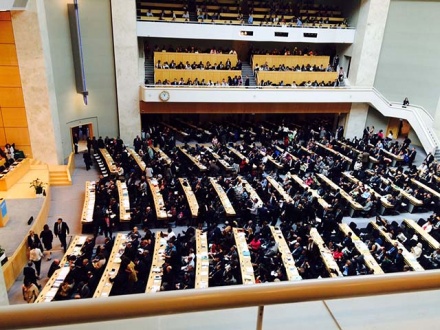
By Rebecca Perl
Civil society groups joined health representatives from 194 members states for the 68th World Health Assembly in Geneva, Switzerland from 18-26 May.
A team from Vital Strategies and our sister organization, The Union, was on hand to attend and for side meetings with member state delegates and partner NGOs, including the NCD Alliance.
The conference opened with a sobering address from Dr. Margaret Chan, Director-General of the World Health Organization (WHO), who highlighted the growing non-communicable disease pandemic.
“NCDs have now overtaken infectious diseases as the principal driver of mortality,” she said
Dr. Chan pointed to the importance of tackling NCDs if the post-2015 sustainable development goals (SDGs) are to be met.
“The inclusion of NCDs in the post-2015 agenda is critical, and gives the health goal relevance to rich and poor countries alike. The SDGs are ambitious and thus financing plans must be equally ambitious, but credible.”
Dr. Chan also noted last year’s Ebola outbreak as a defining moment for the work of WHO, and an historic political moment for world leaders to give the organization new relevance and leadership in global health.
Among resolutions agreed to at the assembly – a global action plan targeting the growing threat of antimicrobial resistance – which is undermining the ability to treat infectious diseases such as tuberculosis.
More than 20% of people treated for TB have multidrug-resistant tuberculosis and 9% of those cases have the even more deadly extensively drug-resistant TB.
Delegates also adopted a resolution to address the health impacts of air pollution. Every year, 4.3 million people die from exposure to indoor air pollution while another 3.7 million die due to outdoor pollution.
The resolution urges Member States to develop air quality monitoring systems, and to establish registries so illnesses related to air pollution can be tracked. Cleaner cooking methods, and clean heating and lighting technology are also key.